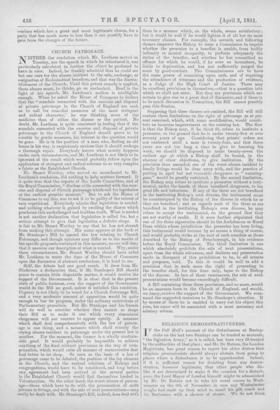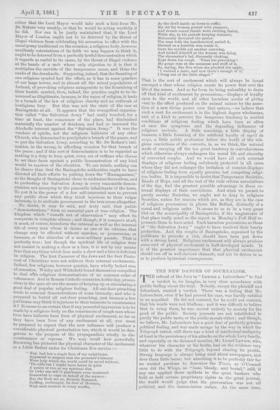RELIGIOUS DEMONSTRATIVENESS.
TF the Pall Mall's account of the disturbances at Basing- stoke on the last two Sundays can be trusted as accurate, "the Srjvation Army," as it is called, has been very ill-treated by the authorities of that place ; and Mr. Dc Rutzen, the London Magistrate, has great reason to regret his ()biter die amn that religious processionists should always abstain from going to places where a disturbance is to be apprehended. Indeed, if it is sufficient reason for desisting from any demon- stration, however legitimate, that other people who dis- like it are determined to make it the occasion for a disturb- ance, the Lord Mayor of London himself might be admonished by Mr. De Rutzen not to take his usual course to West- minster on the 9th of November, in case any Westminster roughs had made up their mind to assail his gilt coach and his Beefeaters with a shower of stones. We do not think
either that the Lord Mayor would take such a hint from Mr. De Rutzen very meekly, or that he would be acting worthily if he did. Nor can it be justly maintained that, if the Lord Mayor of London ought not to be deterred by the threat of illegal violence from celebrating his accession to office with the usual pomp traditional on the occasion, a religious body, however needlessly ostentatious of its faith we may happen to think it, ought to be deterred from a perfectly lawful demonstration which it regards as useful to its cause, by the threat of illegal violence at the hands of a mob whose only objection to it is that it multiplies the recruits of the temperance cause, and thins the ranks of the drunkards. Supposing, indeed, that the flaunting of one religious symbol had the effect, as it has in some quarters of our large towns, and in almost all the mixed populations of Ireland, of provoking religious antagonists to the flourishing of their hostile symbol, then, indeed, the practice ought to be de- nounced as illegitimate, because, in the name of religion, it leads to a breach of the law of religious charity aud an outbreak of irreligious fury. But this was not the state of the case at Basingstoke at all. It appears that the evangelical organisa- tion called "the Salvation Army" had really touched, for a time at least, the conscience of the place, had diminished materially the number of drinkers, and had so incensed the Alcoholic interest against the " Salvation Army." It was the vendors of spirits, not the religious believers of any other Church, who determined to precipitate a breach of the peace, and so put the Salvation Army, according to Mr. De Rutzen's inti- mation, in the wrong, in affording occasion for that breach of the peace ; and if this sort of determination is to be regarded as making it a duty to keep quiet, every set of ruffians who choose to set their faces against a public demonstration of any kind would be masters of the situation. To our minds, nothing can be clearer than that the Basingstoke authorities ought to have directed all their efforts to putting down the " Massaga.nia,ns," as the Roughs of Basingstoke chose to nickname themselves, and to protecting the Salvation Army in every reasonable demon- stration not annoying to the peaceable inhabitanti of the town.
To put it in the power of a few self-interested men to prevent any public show which they think injurious to their vulgar interests, is to abdicate government in the true sense altogether. No doubt, it may be said, and truly said, that public " demonstrations " form no essential part of true religion. The kingdom which " cometh not of observation " may effect its conquests in complete silence ; and though, if it conquers at all, it must, of course, transform the external as well as the internal life of every man whom it claims as one of its citizens, that change may be effected without marches, or processions, or banners, or the stimulus of a semi-military parade. That is perfectly true ; but though the spiritual life of religion does not consist in making a show or a fuss, it is not by any means true that anything which does make a show and a fuss is deficient in religion. The first Passover of the Jews and the first Pente- cost of Christians were not without their external excitements. Indeed, few religions, however quietist, have wholly lacked eras of sensation. Wesley and Whitefield found themselves compelled to deal with religious demonstrations of no common order of vehemence. And in Roman Catholic countries, to this day, proces- sions in the open air are the means of keeping up or stimulating a good deal of popular religious feeling. All out-door preaching tends to external demonstrations of some intensity, and who is prepared to forbid all out-door preaching, just because a few
publicans may think it injurious to their interests to countenance it ? It seems to us certain that if any powerful impression is to be
made by a religious body on the consciences of rough men whose lives have hitherto been lives of physical excitement, so far as they have been lives of any excitement at all, you must be prepared to expect that the new influence will produce a considerable physical perturbation too, which it would be dan- gerous to the purpose of the propagandists wholly to dis- countenance or repress. We may recall how powerfully Browning has pictured the physical character of the excitement in a Little Bethel under its Christmas Eve service ;-
" Nay, had but a single face of my neighbours Appeared to suspect that the preacher's labours Were help which the world could be saved without, 'Tis odds but I might have borne in quiet A qualm or two at my spiritual diet, Or (who can tell P) perchance even mustered Somewhat to urge on behalf of the sermon But the flock sat on, divinely flustered, Sniffing, methought, its dew of Hermon, With such content in every snuffle,
As the devil inside us loves to ruffle.
My old fat woman purred with pleasure, And thumb round thumb went twirling faster, While she, to his periods keeping measure, Maternally devoured the pastor. The man with the handkerchief, untied it, Showed us a horrible won inside it, Gave his eyelids yet another screwing,
And rocked himself as the woman was doing. The shoemaker's lad, discreetly choking, Kept down his cough. 'Tyres too provoking ! My gorge rose at the nonsense and stuff of it, So, saying, like Eve when she plucked the apple, `I wanted a taste, and now there's enough of it,' I flung out of the little chapel."
That is the sort of excitement which will always be found amongst a class whose religion exerts its power first over the life of the senses. And so far from its being unhealthy to drain off that kind of excitement by processions,—displays of loyalty open to the world, aud all other harmless modes of giving vent to the effect produced on the animal nature by the asser- tion of a new divine power over that nature,—we believe that such a vent for excitement is in the highest. degree wholesome, and of a kind to prevent the dangerous tendency to morbid conditions of religious feeling which have been so often at once the symptoms and the degrading influences of religious revivals. A little marching, a little display of
banners, a little fostering of the artificial loyalty of esprit do corps, a little public profession before the world of the reli- gious convictions of the converts, is, as we think, the natural
mode of carrying off the too great tendency to convulsiveness which otherwise always endangers the moral life and sincerity of converted roughs. And we would have all such external displays of religious feeling sedulously protected in all cases where they did not endanger the irritation of counter-displays of religious feeling from equally genuine, but competing religi- ous bodies. It is impossible to doubt that Temperance Societies, Bands of Hope, and all the rest of the rude reform associations of the day, fiud the greatest possible advantage in these ex-
ternal displays of their convictions. And what we permit to purely secular Societies, we ought not to deny to religious Societies, unless for reasons which are, as they are in the case of religious processions in places like Belfast, distinctly of a moral and religions order. It seems to us to be a very great blot on the municipality of Basingstoke, if the magistrates of that place really acted as the report in Monday's Pall Mall re-
presents them to have acted. Such harmless processions as those of " the Salvation Army " ought to have received their hearty protection. And the roughs of Basingstoke, organised by the publicans to provoke a riot, should have been put doWn with a strong hand. Religious excitement will always produce some sort of physical excitement in half-developed minds. It is of the greatest importance that that physical excitement should run off in well-devised channels, and not be driven in so as to produce hyiiterical consequences.

































 Previous page
Previous page